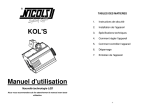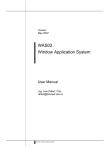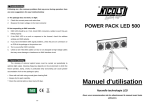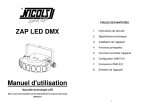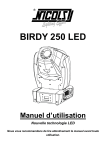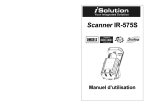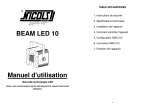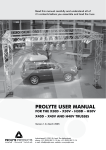Download HOP`S Manuel d`utilisation - SOLIDIS: Sound & Light Distribution
Transcript
TABLES DES MATIERES HOP'S 1. Instructions de sécurité 2. Installation de l'appareil 3. Spécifications techniques 4. Comment régler l'appareil 5. Comment contrôler l'appareil 6. Dépannage 7. Entretien de l'appareil Manuel d'utilisation Nouvelle technologie LED Nous vous recommandons de lire attentivement le manuel avant toute utilisation. 1- 1. Instructions de sécurité 2. Installation de l'appareil Lire attentivement les consignes ci-après. Elles contiennent des informations - L'appareil doit être installé à l'aide des fixations prévues à cet effet. Nous vous importantes sur la sécurité de l'installation ainsi que sur l'utilisation et la recommandons de bien vouloir veiller à ce que l'appareil soit solidement fixé afin que maintenance de l'équipement. celui-ci ne ressente aucune vibration pendant que l'appareil est en marche. Il ne doit pas - Conservez le présent manuel avec l'équipement pour référence ultérieure. En cas de vente de l'équipement à un autre utilisateur, il est important que le présent manuel soit joint à l'équipement afin que le nouvel utilisateur dispose des informations nécessaires à son utilisation et puisse prendre connaissance des mises en gardes relatives à la sécurité. - Assurez-vous que l’alimentation est compatible à la tension locale. - Il est important de relier le conducteur jaune/vert à la terre afin d’éviter tout choc électrique. - Cet appareil n’est conçu que pour une utilisation en intérieur. L’utiliser dans un endroit sec. - L’appareil doit être utilisé dans une pièce bien ventilée et à au moins 50 cm des murs. glisser. - Assurez-vous que la structure sur laquelle l'appareil est fixé est suffisamment solide pour soutenir un poids de 10 fois supérieur à l'appareil. - Assurez-vous de toujours utiliser des câbles pouvant supporter jusqu'à 12 fois le poids de l'appareil. - Nous vous recommandons de faire appel à des professionnels lors de l'installation de l'appareil. Nous vous rappelons que l'appareil doit être placé de telle façon que celui-ci soit hors de portée de toute personne. - Vérifiez que les ouïes de ventilation de l’appareil sont bien dégagées. - Débranchez l’appareil du secteur avant de faire toute réparation ou entretien de l'appareil. - Par sécurité, assurez-vous qu’aucun produit inflammable ne se trouve à côté de l’appareil 3. Specifications Techniques • L'appareil peut être utilisé en configuration DMX 512 ou bien en mode autonome. • En mode MASTER/SLAVE, l'appareil peut être relié à autant d'appareils que vous désirez lors de l’utilisation. - Utilisez des élingues de sécurité pour la fixation de l’appareil. Assurez-vous de toujours et peut ainsi exécuter ses propres effets de lumières pré-enregistrés qui se déclencheront au son de la musique grâce à un micro intégré. tenir l'appareil par sa base. - Il est important de maintenir la température ambiante à un maximum de 40°C. Au delà de cette température, vous ne devez pas faire fonctionner l'appareil. - La surface de l'appareil peut atteindre 85°C. Ne jamais toucher l'appareil pendant son fonctionnement. Eteignez l'appareil et attendez 15 minutes avant de faire toute réparation • L'appareil a plusieurs choix pré-enregistrés de programmes. • Toujours utiliser des câbles pour relier les appareils entre eux. • L'appareil a un système optique très précis et un moteur pas à pas très régulier. • L'appareil est équipé de ventilateurs pour refroidir l'appareil. • Pan: 540° ou entretien de l'appareil. - Si vous rencontrez des problèmes à l’utilisation, éteignez immédiatement l’appareil. - N’essayez pas de réparer l’appareil par vous même. Les réparations effectuées par du personnel non qualifié peuvent engendrer des dommages. Il est important de contacter le revendeur pour toute réparation. Toujours utiliser des pièces de même type. - Ne touchez aucun faisceau électrique pendant l’utilisation, vous pourriez recevoir un choc • Tilt: 220° • Alimentation : 100-240V~50/60Hz • Source lumineuse : 1×20W LED • Dimensions : 184.6 x 199.8 x 389 mm • Poids : 4.6 kg électrique. - Afin d'éviter tout risque de choc électrique ou départ de feu, nous vous recommandons de ne pas exposer l'appareil à la pluie ou à l'humidité. - Le boîtier, les lentilles ou le filtre UV doivent être remplacés s'ils sont endommagés. 2- 3- ENTER pour l'activer. A défaut, vous allez retourner automatiquement sur le menu des 4. Comment contrôler l'appareil fonctions principales sans aucun changement enregistré si vous attendez plus de 8 secondes avant d'appuyer sur le bouton ENTER. Appuyez sur le bouton MENU, si vous 4.1 Panneau de réglage (arrière) désirez retourner à toutes les fonctions principales sans avoir fait de sélection. Les fonctions principales sont détaillées ci-dessous : L'affichage indique tous les menus ainsi que toutes les fonctions de l'appareil LED DMX Allumée Entrée DMX MASTER Allumée Mode MASTER SLAVE Allumée Mode SLAVE SOUND Clignote Activation du son MENU Pour sélectionner les fonctions DOWN Pour atteindre les fonctions précédentes UP Pour atteindre les fonctions suivantes ENTER Pour valider et enregistrer les fonctions sélectionnées Boutons Entrées principales : Fiche IEC et porte fusible intégré. Connexion au câble d'alimentation. Pour les télécommandes seulement : En reliant la télécommande à la prise jack 6.35 du premier appareil, vous contrôlez toutes les autres unités et par conséquent toutes les fonctions et les modes de ces mêmes unités. Sensibilité : Pour ajuster la sensibilité au son Sortie/Entrée DMX : Dans une configuration DMX 512, nous vous recommandons d'utiliser Pour enregistrer l'adresse DMX 512 Appuyez sur le bouton MENU jusqu'a ce que une prise ou câble XLR 3 points. s'affiche. Appuyez ensuite sur le bouton ENTER. L'affichage clignote. Utilisez les boutons DOWN et UP pour changer l'adresse DMX 512. Une fois l'adresse sélectionnée, appuyez sur le bouton ENTER pour la 4.2 Fonctions principales Pour sélectionner n'importe quelles fonctions de l'appareil, appuyez sur le bouton MENU jusqu'à ce que la fonction souhaitée s'affiche. Appuyez sur le bouton ENTER pour sélectionner la fonction. L'affichage clignote. Utilisez les boutons DOWN et UP pour changer le mode. Une fois que le mode souhaité a été sélectionné, appuyez sur le bouton 4- valider. A défaut, vous allez retourner automatiquement sur le menu des fonctions principales sans aucun changement enregistré si vous attendez plus de 8 secondes avant d'appuyer sur le bouton ENTER. Appuyez sur le bouton MENU, si vous désirez retourner à toutes les fonctions principales sans avoir fait de sélection. 5- ENTER. L'affichage clignote. Utilisez les boutons DOWN et UP pour sélectionner soit Le mode Slave (mode normal) ou soit (mode inversion du pan).Une fois le mode souhaité s'affiche. Appuyez ensuite sur le choisi, appuyez sur le bouton ENTER pour le valider. A défaut, vous allez retourner , automatiquement sur le menu des fonctions principales sans aucun changement enregistré (2 light show). Appuyez sur le bouton ENTER pour si vous attendez plus de 8 secondes avant d'appuyer sur le bouton ENTER. Appuyez sur le valider la fonction souhaitée. A défaut, vous allez retourner automatiquement sur le menu bouton MENU, si vous désirez retourner à toutes les fonctions principales sans avoir fait de des fonctions principales sans aucun changement enregistré si vous attendez plus de 8 sélection. Appuyez sur le bouton MENU jusqu'à ce que bouton ENTER. Utilisez les bouton DOWN et UP pour sélectionner soit le mode (mode normal) ou soit le mode secondes avant d'appuyer sur le bouton ENTER. Appuyez sur le bouton MENU, si vous désirez retourner à toutes les fonctions principales sans avoir fait de sélection. Le mode inversion du Tilt Appuyez sur le bouton MENU jusqu'à ce que Le mode Audio s'affiche. Appuyez sur le bouton ENTER. L'affichage clignote. Utilisez les boutons DOWN et UP pour sélectionner soit Appuyez sur le bouton MENU jusqu'à ce que s'affiche. Appuyez sur le bouton ENTER. L'affichage clignote. Utilisez les boutons DOWN et UP pour activer le mode Audio (mode normal) ou soit (mode inversion du tilt).Une fois le mode souhaité choisi, appuyez sur le bouton ENTER pour le valider. A défaut, vous allez retourner (son désactivé). Une fois le mode automatiquement sur le menu des fonctions principales sans aucun changement enregistré souhaité choisi, appuyez sur le bouton ENTER pour le valider. A défaut, vous allez retourner si vous attendez plus de 8 secondes avant d'appuyer sur le bouton ENTER. Appuyez sur le automatiquement sur le menu des fonctions principales sans aucun changement enregistré bouton MENU, si vous désirez retourner à toutes les fonctions principales sans avoir fait de si vous attendez plus de 8 secondes avant d'appuyer sur le bouton ENTER. Appuyez sur le sélection. (son activé) ou pour le désactiver bouton MENU, si vous désirez retourner à toutes les fonctions principales sans avoir fait de sélection. Le mode LED Appuyez sur le bouton MENU jusqu'à ce que Le mode Blackout s'affiche. Appuyez sur le bouton ENTER. L'affichage clignote. Utilisez les boutons DOWN et UP pour activer Appuyez sur le bouton MENU jusqu'à ce que s'affiche. Appuyez sur le bouton ou le mode LED. Une fois le mode souhaité choisi, appuyez sur le bouton désactiver ENTER. L'affichage clignote. Utilisez les boutons DOWN et UP pour activer le blackout (Yes) ENTER pour le valider. A défaut, vous allez retourner automatiquement sur le menu des ou le désactiver (No). Une fois le mode souhaité choisi, appuyez sur le bouton ENTER pour fonctions principales sans aucun changement enregistré si vous attendez plus de 8 le valider. A défaut, vous allez retourner automatiquement sur le menu des fonctions secondes avant d'appuyer sur le bouton ENTER. Appuyez sur le bouton MENU, si vous principales sans aucun changement enregistré si vous attendez plus de 8 secondes avant désirez retourner à toutes les fonctions principales sans avoir fait de sélection. d'appuyer sur le bouton ENTER. Appuyez sur le bouton MENU, si vous désirez retourner à toutes les fonctions principales sans avoir fait de sélection. Le mode inversion Vous pouvez installer votre appareil soit au sol ou soit au plafond. Appuyez sur le bouton Le mode inversion du Pan MENU jusqu'à ce que Appuyez sur le bouton MENU jusqu'à ce que 6- s'affiche. Appuyez sur le bouton changer le mode s'affiche et clignote. Appuyez sur le bouton ENTER pour . Le mode est le mode normal. L'enregistrement se fait 7- automatiquement après 8 secondes. Pour sélectionner le mode bouton ENTER une nouvelle fois. Le mode , appuyez sur le est le mode inversion. Appuyez sur le 5. Comment contrôler l'appareil L'appareil peut fonctionner de trois manières différentes : en mode Master/Slave, en mode bouton MENU, si vous désirez retourner à toutes les fonctions principales sans avoir fait de DMX ou accompagné du contrôleur CA-8. sélection. Il n'est pas nécessaire d'éteindre l'appareil quand vous souhaitez changer l'adresse DMX. La nouvelle adresse DMX va être enregistrée une fois votre réglage terminé. A chaque fois que vous allumez l'appareil, des caractères s'affichent et tous les moteurs se placent en La vérification de la température Appuyez sur le bouton MENU jusqu'à ce que position initiale. Vous entendez le mécanisme se mettre en place pendant environ 20 s'affiche et clignote. Appuyez ensuite sur le bouton ENTER. L'affichage indique la température de l'appareil. Appuyez sur secondes. Enfin, l'appareil est prêt à recevoir le signal DMX. Les programmes pré-enregistrés sont prêts à fonctionner. le bouton MENU, si vous désirez retourner à toutes les fonctions principales sans avoir fait de sélection. 5.1 Le mode Master/Slave En configuration MASTER/SLAVE, en reliant toutes les unités, le premier appareil de la chaîne va contrôler les autres appareils en déclenchant un effet de lumière au son de la Le mode FhRS musique. Cette fonction est intéressante dès lors où vous voulez réaliser une démonstration Appuyez sur le bouton MENU jusqu'à ce que s'affiche et clignote. Appuyez sur le instantanée. bouton ENTER. L'affichage indique le nombre d'heures de fonctionnement de l'appareil. Appuyez sur le bouton MENU, si vous désirez retourner à toutes les fonctions principales Light Show sans avoir fait de sélection. En mode alors que (Mode slave), signifie que les unités fonctionnent normalement signifie qu'il y a 2 light show. Afin de créer une démonstration plus importante, vous pouvez sélectionner mouvements plus contrasté. La version du Logiciel Appuyez sur le bouton MENU jusqu'à ce que sur la deuxième unité pour avoir un effet de s'affiche et clignote. Appuyez sur le bouton ENTER. L'affichage indique le numéro de la version utilisée par l'appareil. Appuyez 5.2 Le mode autonome (avec la télécommande CA-8) sur le bouton MENU, si vous désirez retourner à toutes les fonctions principales sans avoir Vous pouvez utiliser la télécommande CA-8 seulement en mode MASTER/SLAVE. En fait de sélection. connectant les différents appareils en mode MASTER/SLAVE par les connecteurs DMX, la télécommande va contrôler toutes les autres unités et par conséquent toutes les fonctions et modes de ces mêmes unités. Reset Appuyez sur le bouton MENU jusqu'à ce que s'affiche et clignote. Appuyez sur le Stand By Blackout de l'appareil Fonction 1. Sync. Strobe 1. Selection de la couleur 2. Async strobe 2. Selection du gobo bouton ENTER. Tous les canaux de l'appareil vont retourner en position normale. Appuyez sur le bouton MENU, si vous désirez retourner à toutes les fonctions principales sans avoir fait de sélection. 3. Sound Strobe Mode 8- Sound (LED éteinte) LED allumée 9- 5.3 Le mode DMX 5.5 Connexion DMX512 Si vous utilisez un contrôleur DMX universel pour contrôler les unités, vous devez régler Le mode DMX512 est couramment utilisé pour réaliser des effets de lumières. 512 est le l'adresse DMX de 1 à 512 pour que les unités puissent recevoir le signal DMX. Appuyez sur nombre maximum de canaux. le bouton MENU jusqu'à ce que s'affiche. Appuyez sur le bouton ENTER. L'affichage clignote. Utilisez les boutons DOWN et UP pour changer l'adresse DMX 512. Une fois l'adresse sélectionnée, appuyez sur le bouton ENTER et maintenez le bouton enfoncé jusqu'à ce que l'affichage s'arrête de clignoter ou bien attendez 8 secondes pour que l'adresse s'enregistre automatiquement. Appuyez sur le bouton MENU, si vous désirez retourner à toutes les fonctions principales sans avoir fait de sélection Nous vous recommandons de bien vouloir vous référer au schéma ci-dessous pour déterminer le mode DMX des 4 premières unités. 1. Si vous utilisez une télécommande avec une sortie DMX 5 points, vous avez besoin d'utiliser un adaptateur afin d'avoir une sortie DMX 3 points. 2. Sur le dernier appareil, le câble DMX doit avoir un bouchon de terminaison afin de réduire 5.4 Configuration DMX 512 les défauts du signal. Il faut alors souder une résistance de 120 Ohm 1/4W entre la borne 2 (DMX-) et la borne 3 (DMX+) dans une prise XLR 3 points. Raccordez-la à la sortie DMX du dernier appareil 3. Faîtes une chaine avec les appareils en connectant la sortie de la prise XLR de l'appareil à l'entrée de l'appareil suivant. Le câble ne doit pas être branché à un câble en Y. Des câbles inappropriés ou endommagés, des joints soudés ou des connecteurs rouillés peuvent facilement être à l'origine de la déformation du signal et couper le système. 4. La sortie DMX et les connecteurs d'entrée sont traversés par le courant pour maintenir le circuit DMX. 5. Chaque unité doit avoir une adresse DMX réglée pour recevoir les données envoyées par le contrôleur. Le nombre d'adresse est entre 0-511 (habituellement 0 et 1 sont égaux à 1) 6. Les 3 points XLR sont plus utilisés que les 5 points XLR. - 3 points XLR : Borne 1: La terre, Borne 2: signal négatif (-), Borne 3: signal positif (+) - 5 points XLR : Borne 1: La terre, Borne 2: signal négatif (-), Borne 3: signal positif (+) 10- 11- 6. Dépannage 7. Entretien de l'appareil Vous trouverez ci-dessous une liste de problèmes qui pourraient survenir lors de l'utilisation Le nettoyage de l'appareil doit être fait régulièrement pour que le rendu lumineux soit de votre appareil. Nous vous apportons quelques suggestions pour remédier facilement à la optimum. La fréquence du nettoyage de l'appareil dépend essentiellement de situation. l'environnement dans lequel l'appareil est installé : pièces humides, enfumées ou sales. De telles conditions peuvent être à l'origine de l'accumulation de poussière sur les lentilles de A. L'appareil et les ventilateurs ne fonctionnent pas, il n'y pas de lumière l'appareil. 1. Vérifiez la tension sur le connecteur principal. y Nettoyez l'appareil avec un chiffon doux et utilisez un liquide de nettoyage pour vitres. 2. Vérifiez la puissance et le fusible principal. y Il est toujours recommandé d'essuyer correctement toutes les pièces de l'appareil. 3. Vérifiez la tension de la LED y Nettoyez le système optique externe au moins tous les 20 jours. Nettoyez le système optique interne au moins une fois tous les mois ou une fois tous les 2 mois. B. L'appareil ne répond pas au contrôleur DMX 1. La LED DMX doit être allumée. Si ce n'est pas le cas, vérifiez les connecteurs et les câbles pour voir si le raccordement est correct. 2. Si la LED DMX est allumée et que le canal ne répond pas, vérifiez les réglages de l'adresse et la polarité du signal DMX. 3. Si vous rencontrez des problèmes avec le signal DMX mais de façon intermittente, vérifiez les connecteurs ou la carte électronique de l'appareil défaillant ainsi que de l'appareil précédent. 4. Essayer d'utiliser un autre contrôleur DMX. 5. Vérifiez l'absence d'interférences entre les câbles électriques. C. Les appareils ne répondent pas à la télécommande CA-8 1. Vous pouvez avoir une coupure dans le câblage DMX. Vérifiez les LED pour savoir si elles fonctionnent correctement en mode MASTER/SLAVE. 2. L'adresse DMX de l'appareil est fausse. Enregistrez de nouveau la bonne adresse D. Les appareils ne répondent pas à la musique 1. Assurez-vous que les appareils ne reçoivent pas de signal DMX 2. Vérifiez si le micro fonctionne en tapotant dessus. E. Un des canaux ne fonctionne pas correctement 1. Le moteur pas à pas est peut être endommagé ou le câble connecté à la carte est peut être cassé. 2. Le circuit intégré d'entrainement du moteur sur la carte est peut être usagé. 12- 13- 1. Safety Instruction Please read carefully the instruction, which includes important information WARNING about the installation, usage and maintenance. TABLE OF CONTENTS y Please keep this User Guide for future consultation. If you sell the unit to another user, be sure that they also receive this instruction booklet. 1. Safety Instruction y Unpack and check carefully there is no transportation damage before using the unit. y Before operating, ensure that the voltage and frequency of power supply match the power requirements of the unit. 2. Technical Specification y It’s important to ground the yellow/green conductor to earth in order to avoid electric shock. y The unit is for indoor use only. Use only in a dry location. 3. How To Set The Unit y The unit must be installed in a location with adequate ventilation, at least 50cm from adjacent surfaces. Be sure that no ventilation slots are blocked. y Disconnect main power before replacement or servicing. 4. How To Control The Unit y Make sure there is no flammable materials close to the unit while operating as it is fire hazard. y Use safety cable when fixes this unit. Don’t handle the unit by taking its head only, but 5. Troubleshooting always by taking its base. y Maximum ambient temperature is TA: 40℃. Don’t operate it where the temperature is higher than this. 6. Fixture Cleaning y Unit surface temperature may reach up to 85℃. Don’t touch the housing bare-hand during its operation. Turn off the power and allow about 15 minutes for the unit to cool down before replacing or serving. y In the event of serious operating problem, stop using the unit immediately. Never try to repair the unit by yourself. Repairs carried out by unskilled people can lead to damage or malfunction. Please contact the nearest authorized technical assistance center. Always use the same type spare parts. y Do not touch any wire during operation as high voltage might be causing electric shock. Warning y To prevent or reduce the risk of electrical shock or fire, do not expose the unit to rain or moisture. 14- 15- y Do not open the unit within five minutes after switching off. 3. How To Set The Unit y The housing, the lenses, or the ultraviolet filter must be replaced if they are visibly damaged. 3.1 Control Panel Caution There are no user serviceable parts inside the unit. Do not open the housing or attempt any repairs yourself. In the unlikely event your unit may require service, please contact your nearest dealer. Installation The unit should be mounted via its screw holes on the bracket. Always ensure that the unit is firmly fixed to avoid vibration and slipping while operating. Make sure that the Display bracer can support the weight more than 10 times of the unit. And use safety chain which To show the various menus and the selected functions can hold over 12 times weight of the unit when you fix the equipment. LED The equipment must be fixed by professionals. And it must be fixed at a place where is DMX On DMX input present out of the touch of human and has no one pass by or sit down. MASTER On Master Mode SLAVE On Slave Mode SOUND Flashing Sound activation MENU To select the programming functions DOWN To go backward in the selected functions UP To go forward in the selected functions ENTER To confirm the selected functions 2. Technical Specification • The unit is DMX 512 fixture. It features full DMX 512 control. It can be also linked together Button in master/slave connection, as many as required and run by built-in program chase sequences automatically or by sound activation through an internal microphone to create an intelligent effect. • It can be operated by DMX 512 control or can be used as an individual unit without a controller. • Features different preprogrammed chase patterns. • Please use a cable when connecting units together. • Accurate focusable optics system and ultra smooth stepping motors, Fan cooled. • Pan: 540 deg. Tilt: 220 deg. Mains input IEC socket and integrated fuse holder, connect to main power cable. Only for remote control By connect to the 1/4’’ microphone jack to control the unit for Stand by, Function and Mode function. • Voltage: 100-240V~50/60Hz Sensitivity • Light Source: 1×20W LED To adjust the sound receiving sensitivity • Dimension: 184.6 x 199.8 x 389 mm DMX input/output • Weight: 4.6 kg For DMX512 link, use 3-pin XLR plug cable to link the unit together. 3.2 Main Function To select any of the given functions, press the MENU button up to when the required one is showing on the display. Select the function by ENTER button and the display will blink. Use 16- 17- DOWN and UP button to change the mode. Once the required mode has been selected, press the ENTER button to setup or it will automatically return to the main functions without (normal) or (2 light show) mode. Once the mode has been selected, press the ENTER button to setup or automatically return to the main functions without any change any change after idling 8 seconds. To go back to the functions without any change press the after 8 seconds. To go back to the functions without any change press the MENU button MENU button. The main functions are showing below: again. Sound Mode Press the MENU button up to when the is showing on the display. Pressing ENTER button and the display will blink. Use DOWN and UP button to select the Mode on) or (Sound (Sound Mode off) mode. Once the mode has been selected, press the ENTER button to setup or automatically return to the main functions without any change after 8 seconds. To go back to the functions without any change press the MENU button again. Blackout Mode is showing on the display. Pressing Press the MENU button up to when the ENTER button and the display will blink. Use DOWN and UP button to select the (yes blackout) or (no blackout) mode. Once the mode has been selected, press the ENTER button to setup or automatically return to the main functions without any change after 8 seconds. To go back to the functions without any change press the MENU button again. Pan Inversion is showing on the display. Pressing ENTER Press the MENU button up to when the button and the display will blink. Use DOWN and UP button to select the DMX 512 Address Setting or is showing on the display. Pressing ENTER Press the MENU button up to when the button and the display will blink. Use DOWN and UP button to change the DMX512 address. (normal) (pan inversion) mode. Once the mode has been selected, press the ENTER button to setup or automatically return to the main functions without any change after 8 seconds. To go back to the functions without any change press the MENU button again. Once the address has been selected, press the ENTER button to setup or automatically Tilt Inversion return to the main functions without any change after 8 seconds. To go back to the functions without any change press the MENU button again. Press the MENU button up to when the is showing on the display. Pressing ENTER button and the display will blink. Use DOWN and UP button to select the Slave Mode or Press the MENU button up to when the is showing on the display. Pressing ENTER button and the display will blink. Use DOWN and UP button to select the 18- (normal) (tilt inversion) mode. Once the mode has been selected, press the ENTER button to setup or automatically return to the main functions without any change after 8 seconds. To go back to the functions without any change press the MENU button again. 19- 4. How To Control The Unit Led Display You can operate the unit in three ways: Press the MENU button up to when the is showing on the display. Pressing ENTER button and the display will blink. Use DOWN and UP button to select the (Led off) mode. Once the mode has been selected, press the ENTER (Led on) or 1. By master/slave built-in preprogram function 2. By easy controller 3. By universal DMX controller button to setup or automatically return to the main functions without any change after 8 No need to turn the unit off when you change the DMX address, as new DMX address seconds. To go back to the functions without any change press the MENU button again. setting will be effected at once. Every time you turn the unit on, it will show type on the display and move all the motors to their ‘home’ position and you may hear some noises for Inversion about 20 seconds. After that the unit will be ready to receive DMX signal or run the built in Press the MENU button up to when the is showing on the display. Pressing programs. ENTER button and the display will blink. Use DOWN and UP button to select the (normal) or (inversion) mode. Once the mode has been selected, press the ENTER 4.1 Master/Slave Built In Preprogrammed Function button to setup or automatically return to the main functions without any change after 8 By linking the units in master/slave connection, the first unit will control the other units to seconds. To go back to the functions without any change press the MENU button again. give an automatic, sound activated, synchronized light show. This function is good when you want an instant show. Temperature Test 2-light show Press the MENU button up to when the is blinking on the display. Pressing ENTER button and the display will show the temperature of the unit. To go back to the functions press the MENU button again. Fixture Hours In (slave mode), means the unit works normally and means 2-light show. In order to create a great light show, you can set on the second unit to get contrast movement to each other, even if you have two units only. 4.2 Easy Controller Press the MENU button up to when the is blinking on the display. Pressing ENTER The easy remote control is used only in master/slave mode. By connecting to the 1/4” button and the display will show the number of working hours of the unit. To go back to the microphone jack of the first unit, you will find that the remote control on the first unit will functions press the MENU button again. control all the other units functions press the MENU button again. Software version Press the MENU button up to when the Stand By Blackout the unit Function 1. Sync. Strobe 1. Select Color 2. Async strobe 2. Select Gobo is blinking on the display. Pressing ENTER button and the display will show the version of software of the unit. To go back to the functions press the MENU button again. 3. Sound Strobe Mode Reset Sound (LED OFF) LED On is blinking on the display. Pressing ENTER Press the MENU button up to when the button and all channels of the unit will return to their standard position. To go back to the functions without any change press the MENU button again. 20- 21- 4.3 DMX Controller 4.5 DMX512 Connection An universal DMX controller to control the units, you have to set DMX address from 1 to 512 channel so that the units can receive DMX signal. Press the MENU button up to when the The DMX 512 is widely used in intelligent lighting control, with a maximum of 512 channels. is showing on the display. Pressing ENTER button and the display will blink. Use DOWN and UP button to change the DMX512 address. Once the address has been selected, press and keep ENTER button pressed up to when the display stops blinking or storing automatically 8 seconds later. To go back to the functions without any change press the MENU button again. If you use please refer to the following diagram to address your DMX512 channel for the first 4 units. 1. If you using a controller with 5 pins DMX output, you need to use a 5 to 3 pin adapter-cable. 4.4 DMX 512 Configuration 2. At last unit, the DMX cable has to be terminated with a terminator. Solder a 120 ohm 1/4W resistor between pin 2(DMX-) and pin 3(DMX+) into a 3-pin XLR-plug and plug it in the DMX-output of the last unit. 3. Connect the unit together in a `daisy chain` by XLR plug from the output of the unit to the input of the next unit. The cable can not branched or split to a `Y` cable. DMX 512 is a very high-speed signal. Inadequate or damaged cables, soldered joints or corroded connectors can easily distort the signal and shut down the system. 4. The DMX output and input connectors are pass-through to maintain the DMX circuit, when one of the units’ power is disconnected. 5. Each lighting unit needs to have an address set to receive the data sent by the controller. The address number is between 0-511 (usually 0 & 1 are equal to 1). 6. The end of the DMX 512 system should be terminated to reduce signal errors. 7. 3 pin XLR connectors are more popular than 5 pin XLR. 3 pin XLR: Pin 1: GND, Pin 2: Negative signal (-), Pin 3: Positive signal (+) 5 pin XLR: Pin 1: GND, Pin 2: Negative signal (-), Pin 3: Positive signal (+) 5. Troubleshooting Following are a few common problems that may occur during operation. Here are some suggestions for easy troubleshooting: 22- 23- A. The unit does not work, no light and the fan does not work 1. Check the connection of power and main fuse. 2. Measure the mains voltage on the main connector. 3. Check the power on LED. B. Not responding to DMX controller 1. DMX LED should be on. If not, check DMX connectors, cables to see if link properly. 2. If the DMX LED is on and no response to the channel, check the address settings and DMX polarity. 3. If you have intermittent DMX signal problems, check the pins on connectors or on PCB of the unit or the previous one. 4. Try to use another DMX controller. 5. Check if the DMX cables run near or run alongside to high voltage cables that may cause damage or interference to DMX interface circuit. C. Some units don’t respond to the easy controller 1. You may have a break in the DMX cabling. Check the LED for the response of the master/ slave mode signal. 2. Wrong DMX address in the unit. Set the proper address. D. No response to the sound 1. Make sure the unit does not receive DMX signal. 2. Check microphone to see if it is good by tapping the microphone E. One of the channels is not working well 1. The stepper motor might be damaged or the cable connected to the PCB is broken. 2. The motor’s drive IC on the PCB might be out of condition 6. Fixture Cleaning The cleaning of internal and external optical lenses and/or mirrors must be carried out periodically to optimize light output. Cleaning frequency depends on the environment in which the fixture operates: damp, smoky or particularly dirty surrounding can cause greater accumulation of dirt on the unit’s optics. y Clean with soft cloth using normal glass cleaning fluid. y Always dry the parts carefully. y Clean the external optics at least every 20 days. Clean the internal optics at least every 30/60 days. 24- 25-













